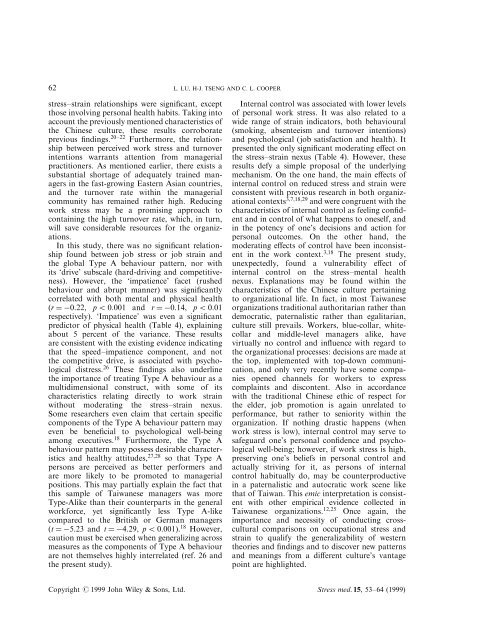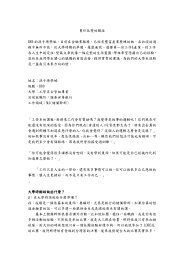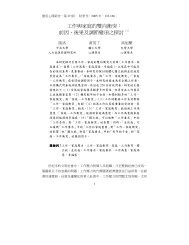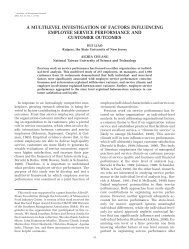Managerial stress, job satisfaction and health in Taiwan
Managerial stress, job satisfaction and health in Taiwan
Managerial stress, job satisfaction and health in Taiwan
You also want an ePaper? Increase the reach of your titles
YUMPU automatically turns print PDFs into web optimized ePapers that Google loves.
62 L. LU, H-J. TSENG AND C. L. COOPER<strong>stress</strong>±stra<strong>in</strong> relationships were signi®cant, exceptthose <strong>in</strong>volv<strong>in</strong>g personal <strong>health</strong> habits. Tak<strong>in</strong>g <strong>in</strong>toaccount the previously mentioned characteristics ofthe Ch<strong>in</strong>ese culture, these results corroborateprevious ®nd<strong>in</strong>gs. 20±22 Furthermore, the relationshipbetween perceived work <strong>stress</strong> <strong>and</strong> turnover<strong>in</strong>tentions warrants attention from managerialpractitioners. As mentioned earlier, there exists asubstantial shortage of adequately tra<strong>in</strong>ed managers<strong>in</strong> the fast-grow<strong>in</strong>g Eastern Asian countries,<strong>and</strong> the turnover rate with<strong>in</strong> the managerialcommunity has rema<strong>in</strong>ed rather high. Reduc<strong>in</strong>gwork <strong>stress</strong> may be a promis<strong>in</strong>g approach toconta<strong>in</strong><strong>in</strong>g the high turnover rate, which, <strong>in</strong> turn,will save considerable resources for the organizations.In this study, there was no signi®cant relationshipfound between <strong>job</strong> <strong>stress</strong> or <strong>job</strong> stra<strong>in</strong> <strong>and</strong>the global Type A behaviour pattern, nor withits `drive' subscale (hard-driv<strong>in</strong>g <strong>and</strong> competitiveness).However, the `impatience' facet (rushedbehaviour <strong>and</strong> abrupt manner) was signi®cantlycorrelated with both mental <strong>and</strong> physical <strong>health</strong>(r ˆ0.22, p 5 0.001 <strong>and</strong> r ˆ0.14, p 5 0.01respectively). `Impatience' was even a signi®cantpredictor of physical <strong>health</strong> (Table 4), expla<strong>in</strong><strong>in</strong>gabout 5 percent of the variance. These resultsare consistent with the exist<strong>in</strong>g evidence <strong>in</strong>dicat<strong>in</strong>gthat the speed±impatience component, <strong>and</strong> notthe competitive drive, is associated with psychologicaldi<strong>stress</strong>. 26 These ®nd<strong>in</strong>gs also underl<strong>in</strong>ethe importance of treat<strong>in</strong>g Type A behaviour as amultidimensional construct, with some of itscharacteristics relat<strong>in</strong>g directly to work stra<strong>in</strong>without moderat<strong>in</strong>g the <strong>stress</strong>±stra<strong>in</strong> nexus.Some researchers even claim that certa<strong>in</strong> speci®ccomponents of the Type A behaviour pattern mayeven be bene®cial to psychological well-be<strong>in</strong>gamong executives. 18 Furthermore, the Type Abehaviour pattern may possess desirable characteristics<strong>and</strong> <strong>health</strong>y attitudes, 27,28 so that Type Apersons are perceived as better performers <strong>and</strong>are more likely to be promoted to managerialpositions. This may partially expla<strong>in</strong> the fact thatthis sample of <strong>Taiwan</strong>ese managers was moreType-Alike than their counterparts <strong>in</strong> the generalworkforce, yet signi®cantly less Type A-likecompared to the British or German managers(t ˆ5.23 <strong>and</strong> t ˆ4.29, p 5 0.001). 18 However,caution must be exercised when generaliz<strong>in</strong>g acrossmeasures as the components of Type A behaviourare not themselves highly <strong>in</strong>terrelated (ref. 26 <strong>and</strong>the present study).Internal control was associated with lower levelsof personal work <strong>stress</strong>. It was also related to awide range of stra<strong>in</strong> <strong>in</strong>dicators, both behavioural(smok<strong>in</strong>g, absenteeism <strong>and</strong> turnover <strong>in</strong>tentions)<strong>and</strong> psychological (<strong>job</strong> <strong>satisfaction</strong> <strong>and</strong> <strong>health</strong>). Itpresented the only signi®cant moderat<strong>in</strong>g e€ect onthe <strong>stress</strong>±stra<strong>in</strong> nexus (Table 4). However, theseresults defy a simple proposal of the underly<strong>in</strong>gmechanism. On the one h<strong>and</strong>, the ma<strong>in</strong> e€ects of<strong>in</strong>ternal control on reduced <strong>stress</strong> <strong>and</strong> stra<strong>in</strong> wereconsistent with previous research <strong>in</strong> both organizationalcontexts 3,7,18,29 <strong>and</strong> were congruent with thecharacteristics of <strong>in</strong>ternal control as feel<strong>in</strong>g con®dent<strong>and</strong> <strong>in</strong> control of what happens to oneself, <strong>and</strong><strong>in</strong> the potency of one's decisions <strong>and</strong> action forpersonal outcomes. On the other h<strong>and</strong>, themoderat<strong>in</strong>g e€ects of control have been <strong>in</strong>consistent<strong>in</strong> the work context. 3,18 The present study,unexpectedly, found a vulnerability e€ect of<strong>in</strong>ternal control on the <strong>stress</strong>±mental <strong>health</strong>nexus. Explanations may be found with<strong>in</strong> thecharacteristics of the Ch<strong>in</strong>ese culture perta<strong>in</strong><strong>in</strong>gto organizational life. In fact, <strong>in</strong> most <strong>Taiwan</strong>eseorganizations traditional authoritarian rather th<strong>and</strong>emocratic, paternalistic rather than egalitarian,culture still prevails. Workers, blue-collar, whitecollar<strong>and</strong> middle-level managers alike, havevirtually no control <strong>and</strong> <strong>in</strong>¯uence with regard tothe organizational processes: decisions are made atthe top, implemented with top-down communication,<strong>and</strong> only very recently have some companiesopened channels for workers to expresscompla<strong>in</strong>ts <strong>and</strong> discontent. Also <strong>in</strong> accordancewith the traditional Ch<strong>in</strong>ese ethic of respect forthe elder, <strong>job</strong> promotion is aga<strong>in</strong> unrelated toperformance, but rather to seniority with<strong>in</strong> theorganization. If noth<strong>in</strong>g drastic happens (whenwork <strong>stress</strong> is low), <strong>in</strong>ternal control may serve tosafeguard one's personal con®dence <strong>and</strong> psychologicalwell-be<strong>in</strong>g; however, if work <strong>stress</strong> is high,preserv<strong>in</strong>g one's beliefs <strong>in</strong> personal control <strong>and</strong>actually striv<strong>in</strong>g for it, as persons of <strong>in</strong>ternalcontrol habitually do, may be counterproductive<strong>in</strong> a paternalistic <strong>and</strong> autocratic work scene likethat of <strong>Taiwan</strong>. This emic <strong>in</strong>terpretation is consistentwith other empirical evidence collected <strong>in</strong><strong>Taiwan</strong>ese organizations. 12,25 Once aga<strong>in</strong>, theimportance <strong>and</strong> necessity of conduct<strong>in</strong>g crossculturalcomparisons on occupational <strong>stress</strong> <strong>and</strong>stra<strong>in</strong> to qualify the generalizability of westerntheories <strong>and</strong> ®nd<strong>in</strong>gs <strong>and</strong> to discover new patterns<strong>and</strong> mean<strong>in</strong>gs from a di€erent culture's vantagepo<strong>in</strong>t are highlighted.Copyright # 1999 John Wiley & Sons, Ltd. Stress med. 15, 53±64 (1999)
















